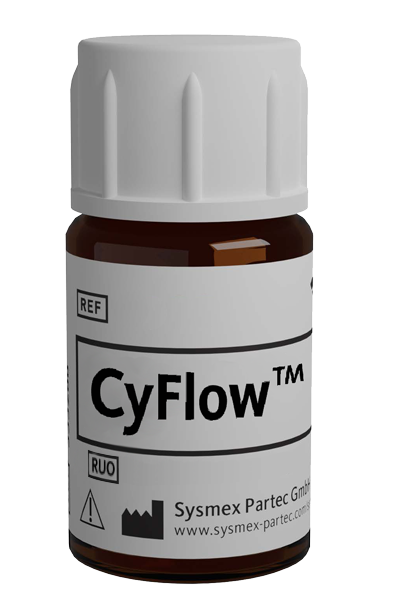CyFlow™ CD4 Purified

| Alternative Name: | Leu3a, T4 |
| Antibody: | Yes |
| Antigen: | CD4 |
| Application: | Flow cytometry, Functional assays, Immunocytochemistry, Immunohistochemistry (frozen sections), Immunoprecipitation |
| Clonality: | monoclonal |
| Clone: | GK1.5 |
| Field of Interest: | Immunophenotyping, MHC |
| Format/Fluorochrome: | Purified |
| Isotype: | IgG2b |
| Regulatory Status: | RUO |
| Source Species: | Rat |
| Target Species: | Mouse |
| Product number: | AU232784 |
For Research Use Only
| HLDA Workshop | HLDA V—WS Code T T-CD04.10 HLDA VI—WS Code T 6T-013 |
| Concentration Unit | mg/mL |
| Concentration | 1 |
| Quantity | 0.1 mg |
| Volume | 0.1 mL |
| Immunogen | Mouse CTL clone V4 cells |
| Background Information | CD4 (T4, Leu3a) is a 55 kDa single-chain transmembrane glycoprotein expressed on a subset of T lymphocytes (''helper'' T-cells) and also on monocytes, tissue macrophages and granulocytes. In extracellular region there are 4 immunoglobulin-like domains (1 Ig-like V-type and 3 Ig-like C2-type). Transmembrane region forms 25 aa, cytoplasmic tail consists of 38 aa. Domains 1, 2 and 4 are stabilized by disulfide bonds. The intracellular domain of CD4 is associated with p56Lck, a Src-like protein tyrosine kinase. |
| Storage Buffer | The reagent is provided in phosphate buffered saline (PBS) solution, pH ≈7.4, containing 0.09% (w/v) sodium azide. |
| Storage | Avoid prolonged exposure to light. Store in the dark at 2-8°C. Do not freeze. |
| Stability | Do not use after expiration date stamped on vial label. |
| Dialynas DP, Wilde DB, Marrack P, Pierres A, Wall KA, Havran W, Otten G, Loken MR, Pierres M, Kappler J, et al: Characterization of the murine antigenic determinant, designated L3T4a, recognized by monoclonal antibody GK1.5: expression of L3T4a by functional T cell clones appears to correlate primarily with class II MHC antigen‑reactivity. Immunol Rev. 1983; 74:29‑56. < PMID: 6195085 > | Dialynas DP, Quan ZS, Wall KA, Pierres A, Quintáns J, Loken MR, Pierres M, Fitch FW: Characterization of the murine T cell surface molecule, designated L3T4, identified by monoclonal antibody GK1.5: similarity of L3T4 to the human Leu‑3/T4 molecule. J Immunol. 1983 Nov; 131(5):2445‑51. < PMID: 6415170 > | Wilde DB, Marrack P, Kappler J, Dialynas DP, Fitch FW: Evidence implicating L3T4 in class II MHC antigen reactivity: monoclonal antibody GK1.5 (anti‑L3T4a) blocks class II MHC antigen‑specific proliferation, release of lymphokines, and binding by cloned murine helper T lymphocyte lines. J Immunol. 1983 Nov; 131(5):2178‑83. < PMID: 6195255 > | Wu L, Antica M, Johnson GR, Scollay R, Shortman K: Developmental potential of the earliest precursor cells from the adult mouse thymus. J Exp Med. 1991 Dec 1; 174(6):1617‑27. < PMID: 1683894 > | Godfrey DI, Kennedy J, Gately MK, Hakimi J, Hubbard BR, Zlotnik A: IL‑12 influences intrathymic T cell development. J Immunol. 1994 Mar 15; 152(6):2729‑35. < PMID: 7511624 > | Gavett SH, Chen X, Finkelman F, Wills-Karp M: Depletion of murine CD4+ T lymphocytes prevents antigen‑induced airway hyperreactivity and pulmonary eosinophilia. Am J Respir Cell Mol Biol. 1994 Jun; 10(6):587‑93. < PMID: 8003337 > | Zheng B, Han S, Kelsoe G: T helper cells in murine germinal centers are antigen‑specific emigrants that downregulate Thy‑1. J Exp Med. 1996 Sep 1; 184(3):1083‑91. < PMID: 9064325 > | Felix NJ, Donermeyer DL, Horvath S, Walters JJ, Gross ML, Suri A, Allen PM: Alloreactive T cells respond specifically to multiple distinct peptide‑MHC complexes. Nat Immunol. 2007 Apr; 8(4):388‑97. < PMID: 17322886 > | Yi H, Zhen Y, Zeng C, Zhang L, Zhao Y: Depleting anti‑CD4 monoclonal antibody (GK1.5) treatment: influence on regulatory CD4+CD25+Foxp3+ T cells in mice. Transplantation. 2008 Apr 27; 85(8):1167‑74. < PMID: 18431238 > | Hu M, Watson D, Zhang GY, Graf N, Wang YM, Sartor M, Howden B, Fletcher J, Alexander SI: Long‑term cardiac allograft survival across an MHC mismatch after "pruning" of alloreactive CD4 T cells. J Immunol. 2008 May 15; 180(10):6593‑603. < PMID: 18453578 >
